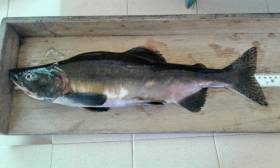Displaying items by tag: Pacific pink salmon
Anglers Alerted Over Non-Native Pacific Pink Salmon
Inland Fisheries Ireland (IFI) is appealing for the angling community and general public to report any sightings of Pacific pink salmon after a specimen was caught in Co Mayo this week.
Also known as ‘humpback’ salmon, pink salmon were very rare in Irish waters until 2017 and are believed to have originated from stocking programmes in Russia.
Scientists at IFI are concerned that if there are large numbers of the non-native species in Irish rivers, this may have negative impacts on Ireland’s salmon and trout populations in the future.
Dr Paddy Gargan with IFI says: “If Pacific pink salmon become established in Irish rivers, they will be competing with Irish salmon and trout for food and space.
“Pink salmon also display aggressive behaviour towards native fish and a large invasion of pink salmon could push out Atlantic salmon and trout from holding pools into smaller channels.”
IFI has published a guide on its website to help the public identify Pacific pink salmon, which have large oval black spots on their tails. Males also develop a pronounced ‘humpback’.
Appealing for help from the angling community and general public, Dr Gargan adds: “There is only limited information currently available to assess the threat from Pacific pink salmon, so we are asking the angling community and general public to report any sightings to Inland Fisheries Ireland by telephoning our 24 hour confidential hotline on 1890 34 74 24.”
The first reported catch of a Pacific pink salmon in Ireland this year was in the Ridge Pool at the Moy Fishery in Co Mayo on Sunday 27 June.
Anglers across the country are also being asked to report any further catches of Pacific pink salmon to IFI and to assist with research efforts by following these steps:
- Keep the Pacific pink salmon and do not release it back into the water, even in rivers that are only open for ‘catch and release’ angling.
- Record the date and location of capture, and the length and weight of the fish.
- Take a photograph of the fish and keep a copy of the image.
- Tag the fish and please report it to Inland Fisheries Ireland as soon as possible by telephoning 1890 34 74 24.
IFI will arrange collection of Pacific pink salmon catches for further analysis and will also promptly issue replacement tags to anglers.
Inland Fisheries Ireland (IFI) has renewed its appeal to angling enthusiasts and the general public to be vigilant and report the presence of any Pacific pink salmon encountered in Irish river systems over the coming months.
In 2017, this non-native fish species unexpectedly appeared in unprecedented numbers in multiple river systems in the south-west, west and north-west of the country.
As pink salmon predominantly have a two-year lifecycle, there is potential for the species to reappear in Irish rivers again this year and every second, so-called ‘odd’ year thereafter.
However, they can also turn up in ‘even’ years and a single specimen was recorded in the River Suir in 2018.
Also known as humpback salmon, pink salmon are a migratory species, native to river systems in the northern Pacific Ocean and nearby regions of the Bering Sea and Arctic Ocean.
The species also has established populations in rivers in northernmost Norway and in the far northwest of Russia, originating from stocking programmes undertaken in this part of Russia since the 1950s until 2001.
Although a single specimen was first recorded in Ireland in 1973, they were very rare in Irish waters until 2017.
In the past week, pink salmon have been reported returning to rivers further south in Norway than anticipated which increases the likelihood of their reappearance in Irish rivers this year.
“The potential presence of pink salmon in Irish rivers again is of ongoing concern to Inland Fisheries Ireland as its presence in large numbers may negatively impact some of Ireland’s native species such as Atlantic salmon and sea trout as well as estuarine and coastal marine fish species and their associated ecosystems,” says Dr Cathal Gallagher, IFI’s head of R&D.
“Despite only very limited information being currently available to assess such threats, the climatic and environmental conditions in Ireland are considered quite amenable to facilitate the establishment of Pacific pink salmon populations in Irish river systems.”
IFI has developed an identification guide (2.31 MB PDF) to help anglers and the general public identify pink salmon.
Anglers are asked to report catches of pink salmon to IFI’s 24 hour confidential hotline number at 1890 34 74 24 or 1890 FISH 24. As these fish die after spawning, some dead specimens could also be encountered along Irish rivers.
Anyone who catches a pink salmon is asked to:
- Take a photograph of the fish
- Tag the fish and present it to IFI and a new tag will be issued to replace the tag used
- Record the date and location of capture, and the length and weight of the fish
- Keep the fish and do not release it back into the water (even in rivers only open for catch and release angling)
IFI will then arrange collection of the fish for further examination. This will help establish the abundance and extent of distribution of the species in Irish waters.





























































